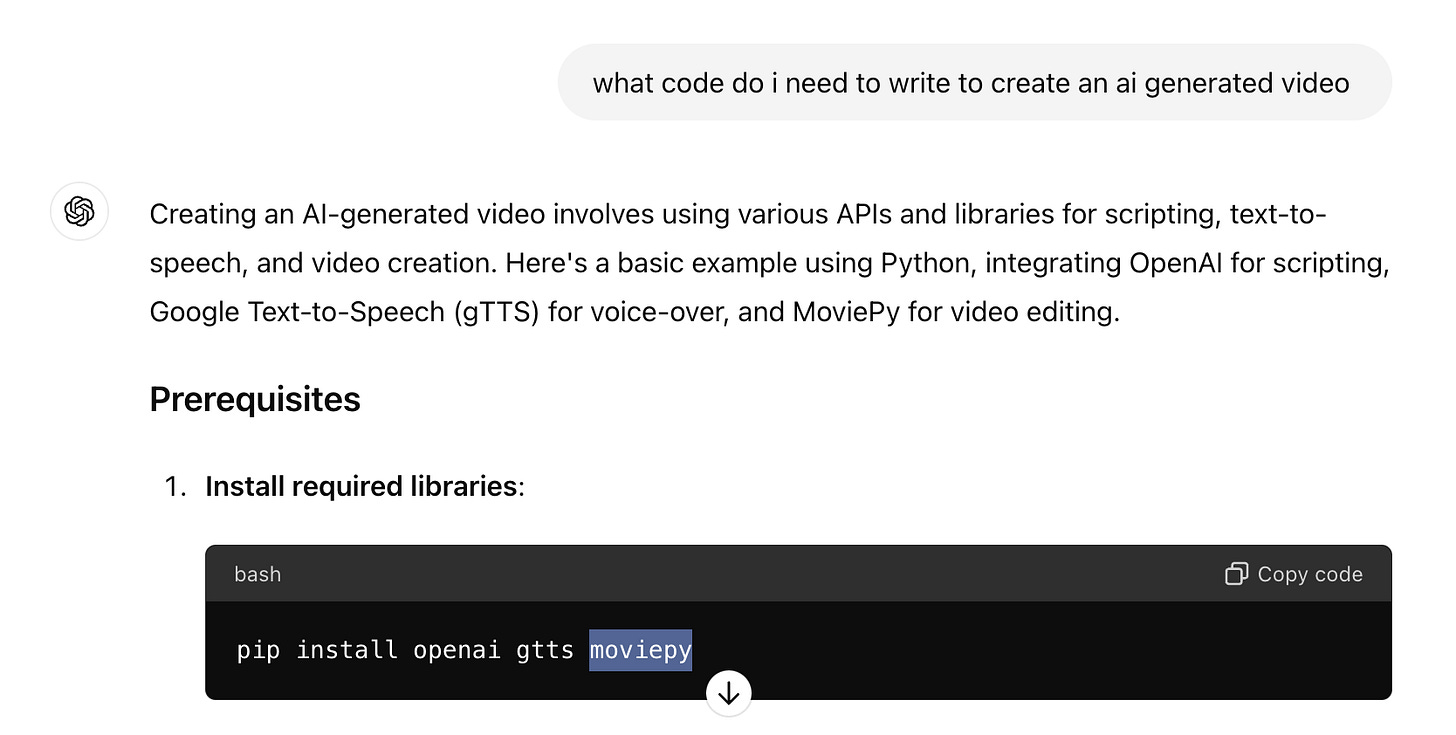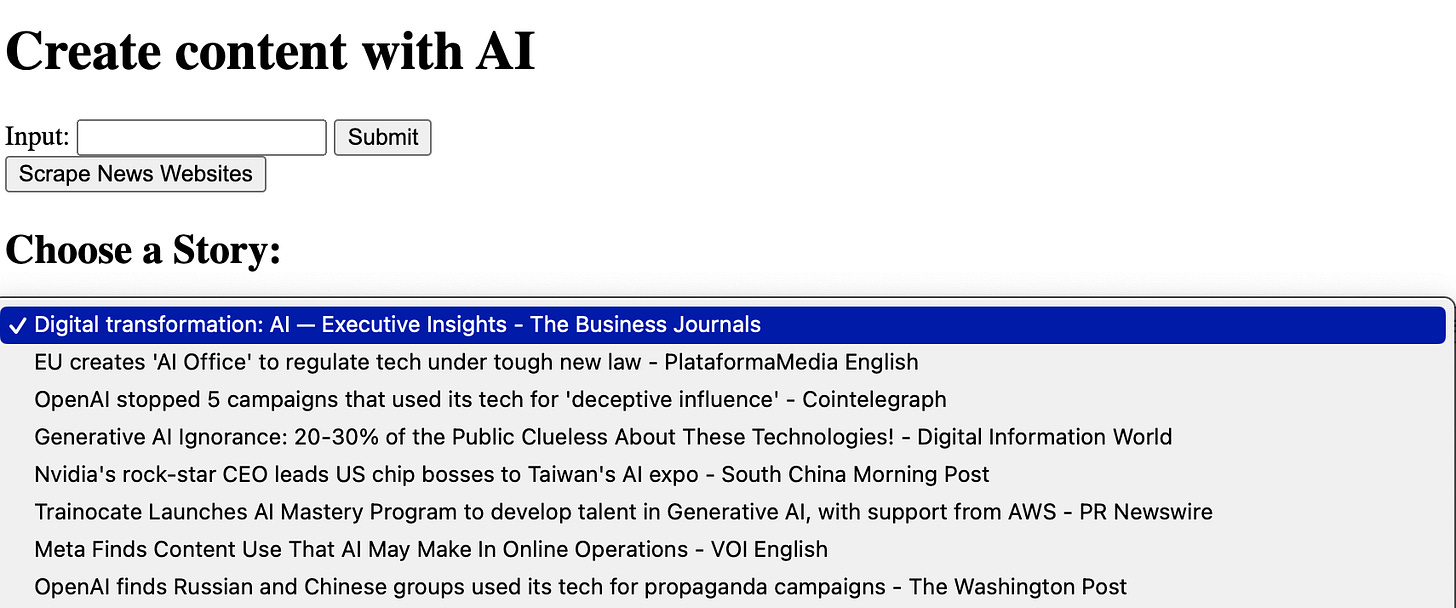Why is the media selling their prized content to OpenAI?
PLUS The first step to building an AI fuelled YouTube channel...
There was a ruckus between Scarlett Johansson and OpenAI earlier this month. It is clear that the tech company deliberately appropriated her voice for their new assistant. Professional mannequin Sam Altman, a week before Johansson’s claim, tweeted out the word “her” seemingly acknowledging the existence of the movie where Johansson plays a flirty AI. Altman claims it is his favourite movie, though he must have only seen the first hour, because it concludes on the message that it is pointless for us to interact with obsequious computers rather than other humans. The smoking gun is that OpenAI were in talks with Johansson to be “hired” as a voice, she turned it down… but they released it anyway.
It showed distinctly that OpenAI’s attitude is that of a creative mafia: they will come and ask nicely, maybe even offer you a couple of coins, but if you decline they will simply take what they want.
In response, OpenAI said the voice wasn’t actually built from clips of Johansson and lawyers have said that because it is the voice of her playing an AI character from a movie rather than the real her then the case could be diluted. Either way, OpenAI have taken the voice down.
And since then it feels like the creative world is simply going to take any scraps it is afforded in this new age. On Wednesday it was announced that US magazine The Atlantic is being paid for its content to be used by ChatGPT. The Atlantic should be given credit, because on the same day they released an article titled “A Devil’s Bargain with OpenAI”. Ironically, I wasn’t able to read the whole of this article for free before I was bombarded with banners urging me to “sign in” and “start a free trial” and the piece vanished behind a paywall. This is a problem I imagine I won’t face once I can just access all the best parts of their content through ChatGPT. Vox Media, News Corp and The Financial Times have all recently signed similar deals.
The idea is that ChatGPT will freely be able to quote these publications and then there will be a citation and a link to the original source. But if I’m not a subscriber to The Atlantic, for example, then if I click out of my cosy chatbot I’m going to collide directly with an ask for money. This is a reminder that casually reading articles on the Internet from a range of publications is largely over anyway, so why does this step towards AI feel so significant and grating?
My first thought when I heard of these payouts to big media companies was positive. I reasoned that Google or Facebook drained the system for years and we largely allowed them to do it without paying a cent. And the expectation that they should pay the outlets that they were linking to only came much later. Meanwhile, these deals with OpenAI are ranging from estimates of $5 million (for The Financial Times) to $250 million (for News Corp).
The problem here though is if I am searching or scrolling, by design I am engaging in the pursuit for something better than where I am. I am WANTING to click away from my Google search or Newsfeed (despite the algorithm’s endeavour to keep serving me tasty morsels). When I read a press release from The Atlantic it feels like they think ChatGPT is a search engine… it is not. If I’m on ChatGPT I am engaged in a conversation. I may even be in the middle of an argument with the AI and so I’m not going to want to break this flow to go to a static webpage. If we thought social media wasn’t conducive to clicking away then these apps are on a whole other level.
But perhaps most worrying is that these companies that are signing with OpenAI are invariably setting up a “lab” which as The Atlantic puts it is a “sandbox for our product and technology team”. They even explicitly say their editorial team won’t be involved. This icing out of the people creating the actual stories is never a good way to go, but in this climate perhaps the strategy is to take the money being offered because soon they will come and take your stuff anyway and give you nothing.
Coding Corner (the gradual process of a journalist learning how to code)
I had an ambition last year of building an AI generated podcasting network. I wrote about it here. I settled on one show (where everything is AI generated) that I have kept going as an experiment. But since then the LLMs that generate the scripts and the services that produce the voices have gotten better and I’ve started to wonder if an AI YouTube channel is genuinely possible now.
Like all my ideas these days… I run it past ChatGPT first.
If you try to code with ChatGPT (when you are not a coder like me) it can be a fascinating and exhilarating experience, but you can also get bound to routines that aren’t useful, but you do them because ChatGPT told you to and you didn’t know any better. This is why I have always used Google Colab (it is a Python environment that just opens like a Google doc in a browser). But now I am using a free program called Visual Studio Code, because it is a tad more stable and it is easier to shift your app from your machine to the cloud. Because if you are building chatbots you need them to run when your machine isn’t on, hence why you upload them to a server like AWS.
So, first I ask for code from ChatGPT to scrape the web for conversation topics. This info will be used to build the video’s script. I put this code into Visual Studio Code.
The step I have often floundered on is displaying my apps neatly on a website that the whole world can see (usually they exist as code that’s just for me). So, I push ChatGPT for this HTML chat interface. This is what I get…
You click the “Scrape News Websites” button and it displays today’s stories and allows you to choose which ones will go into your video’s script.
I’ll be continuing to build this experiment in the coming weeks and I will be sharing my findings in this newsletter.
What AI was used in creating this newsletter?
The images above were created with ChatGPT. Though ChatGPT-4o is mind blowing for code, its voice is becoming more distinct when asking it to write and this is making it less useful for creating written content.
For $5 a month you can help support this newsletter (and keep it free for everyone).
Updates from our WhatsApp Community
Here are this week’s best links and tools from our beloved WhatsApp Community:
CITE from Zimbabwe is looking for suggestions on what to name their second AI newsreader. I wrote about their first one here.
We have been chatting about how Custom GPTs are now available to everyone (you can access them on the free plan, but can only create one if you are paying). Here are the best ones for journalists. Thanks goes to Mike Salzwedel for the info.
What is happening at Develop AI?
Develop AI is proud to be offering AI courses to anyone who needs them. Live and personal online classes. We have created a paid course which teaches the importance of embracing AI in an ethical manner. We will give you a considerable set of skills in AI tools and development. 16 hours of training over 4 weeks where you will be trained on how to use AI practically in your life and work. AI tools, voice cloning, AI & video, coding with AI & how to automate your life. Sign up here.
I am teaching a course in AI next week to the Moldova School of Journalism. I designed the course to take journalists from an introduction in AI to automating their workflows and contributing to their own AI policies.
See you next week. All the best,
Develop Al is an innovative company that reports on AI, builds AI focused projects and provides training on how to use AI responsibly.
Check out Develop AI’s press and conference appearances.
Listen to our AI generated podcast (and ask us to make you one of your own).
Also, look at our training workshops (and see how your team could benefit from being trained in using AI).
This newsletter is syndicated to millions of people on the Daily Maverick.
Email me directly on paul@developai.co.za. Or find me on our WhatsApp Community.
Follow us on TikTok / LinkedIn / X / Instagram. Or visit the website.
For $5 a month you can help support this newsletter (and keep it free for everyone).
Physically we are based in Cape Town, South Africa.
If you aren’t subscribed to this newsletter, click here.









Very interesting. Crazy that ChatGPT would pay The Atlantic?! Seems sus. They are scraping the rest of the web for free, and Atlantic are one of the most heinously biased MSM publications. I wonder if they are not just going bankrupt and ChatGPT has infinite coffers - it seems.